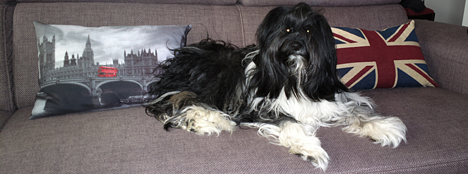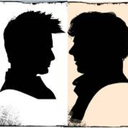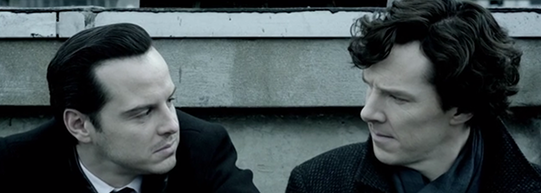
BBC Sherlock Fan Forum - Serving Sherlockians since February 2012.
- zeratul
- Consulting Criminal
 Offline
Offline 
- From: Germany, NRW
- Registered: January 10, 2014
- Posts: 951
Re: German air date
Yes, I feel the same.
It wasn't a hard thing to translate.
"I heard you"
"Ich habe dich gehört"
Would have been so easy...
But still... so that is why I think they thought, oooh it would be funny if he says "erhört" and just changed it without getting the vibe...
I wonder if they even watch the original or just use the script...
________________________________________
It feels squishy! Is it supposed to feel squishy?

You’ve salted away every fact under the sun!
- KeepersPrice
- Official Blogger
 Offline
Offline 
- From: Andover, Massachusetts
- Registered: June 8, 2012
- Posts: 1,721
Re: German air date
tobeornot221b wrote:
Sherlock's original "I heard you" tells me he was genuinely touched by John's speech, whereas "ich habe Sie erhört" gives the impression of a Sherlock treating John with condescension - always coldly being in control.
Bit not good...
I'm curious how "ich habe Sie erhort" translates to English so I can understand why all of you are upset about it. What is it and how does it change the meaning to something a bit not good?
Last edited by KeepersPrice (April 24, 2014 10:54 pm)
---------------------------------------------------------------------------------------------------------------------------------------------
And I said "dangerous" and here you are.
You. It's always you. John Watson, you keep me right.

- zeratul
- Consulting Criminal
 Offline
Offline 
- From: Germany, NRW
- Registered: January 10, 2014
- Posts: 951
Re: German air date
Well it is like he answers his prayer. Means something like, somebody begs for sth and the other one hears it AND makes it become true...
While in the original Sherlock is just telling John that he was there and heard what John said...
________________________________________
It feels squishy! Is it supposed to feel squishy?

You’ve salted away every fact under the sun!
- KeepersPrice
- Official Blogger
 Offline
Offline 
- From: Andover, Massachusetts
- Registered: June 8, 2012
- Posts: 1,721
Re: German air date
Thanks. I think I understand now. The German translation really doesn't have that heartfelt touch that made the scene in the hallway so lovely, does it? You know, it took me a while to come to terms with TEH - but when I finally did, it had a lot to do with that one line.
---------------------------------------------------------------------------------------------------------------------------------------------
And I said "dangerous" and here you are.
You. It's always you. John Watson, you keep me right.

- zeratul
- Consulting Criminal
 Offline
Offline 
- From: Germany, NRW
- Registered: January 10, 2014
- Posts: 951
Re: German air date
Yes also the way the German Sherlock voice says it is quite condescendingly... Like hey, I am so much better than you and I don't even address you in an informal way, like it would be normal when I am your best friend, but hey this time, yeah, I heard your prayer, I am such a big, important man...
*puke*
________________________________________
It feels squishy! Is it supposed to feel squishy?

You’ve salted away every fact under the sun!
- gently69
- One More Miracle
 Offline
Offline 
- From: Germany
- Registered: November 18, 2013
- Posts: 6,646
Re: German air date
Exactly, zeratul, couldn't put it better.
-----------------------------------------------------------------------------------------------------------------------------------------------------------------------------------------------------
Ten:" I'm burning up a sun just to say goodbye."

Sherlock: "I heard you.”
"Temptation coursing through our veins "
(Tony Hadley)
- TeeJay
- On The Side Of The Angels
 Offline
Offline 
- From: Germany
- Registered: January 11, 2014
- Posts: 1,039
Re: German air date
You know which word play will also get completely lost in German? Der Elefant im Zimmer.
And for those who might not know the saying, this was a pun on the expression "the elephant in the room", which is what you use when there's something really obvious that no one wants to talk about. Like, say, a friend was 8 months pregnant and no one knew about it, and then you meet her but no one dares ask her about it. Then the pregnancy becomes the elephant in the room.
Last edited by TeeJay (April 25, 2014 6:45 am)
___________________________________________
"Oh please. Killing me, that's so two years ago."
DominionFans.com
- gently69
- One More Miracle
 Offline
Offline 
- From: Germany
- Registered: November 18, 2013
- Posts: 6,646
Re: German air date
You are right. That will certainly turn into something like "der Elefant im Porzellanladen" ... because they HAVE to use an elephant. ![]()
-----------------------------------------------------------------------------------------------------------------------------------------------------------------------------------------------------
Ten:" I'm burning up a sun just to say goodbye."

Sherlock: "I heard you.”
"Temptation coursing through our veins "
(Tony Hadley)
- zeratul
- Consulting Criminal
 Offline
Offline 
- From: Germany, NRW
- Registered: January 10, 2014
- Posts: 951
Re: German air date
Hm well no they do not have to.
They could still cut the "tröröö" and put in sth completely different.
Yeah, elephant in the room, like sth stareing in your face... mhh I am really searching for the German version of that. Funny thing, I am starting to forget some German words, when English fit better...
"Den Wald vor lauter Bäumen nicht sehen" mhh no that's not really it, is it?
"Der blinde mit Krückstock" maybe? ^^
________________________________________
It feels squishy! Is it supposed to feel squishy?

You’ve salted away every fact under the sun!
- gently69
- One More Miracle
 Offline
Offline 
- From: Germany
- Registered: November 18, 2013
- Posts: 6,646
Re: German air date
Ok, if they cut the sound as well ... they don't have to ...
-----------------------------------------------------------------------------------------------------------------------------------------------------------------------------------------------------
Ten:" I'm burning up a sun just to say goodbye."

Sherlock: "I heard you.”
"Temptation coursing through our veins "
(Tony Hadley)
- zeratul
- Consulting Criminal
 Offline
Offline 
- From: Germany, NRW
- Registered: January 10, 2014
- Posts: 951
Re: German air date
But I also think they will screw that... Your guess could be right.
________________________________________
It feels squishy! Is it supposed to feel squishy?

You’ve salted away every fact under the sun!
- Mattlocked
- One More Miracle
 Offline
Offline 
- From: Germany
- Registered: June 29, 2012
- Posts: 6,781
Re: German air date
I think we only would be really satisfied with the translation if a Sherlock fan like we are did it. Which of course isn't the case.
Zeratul: "Funny thing, I am starting to forget some German words, when English fit better..."
Happens to me, too. Sometimes I know immediately the English word, but cannot remember the German expression.
A lot of English words even sound better, so the meaning of a word is underlined by the sound of it.
So I sometimes use the English word. Hubby always rolls his eyes when I do that. ![]()
I didn't even notice: We don't have "the elephant in the room" in German? ![]()
![]()
__________________________________
"After all this time?" "Always."
Good bye, Lord Rickman of the Alan
- zeratul
- Consulting Criminal
 Offline
Offline 
- From: Germany, NRW
- Registered: January 10, 2014
- Posts: 951
Re: German air date
Yeah, my hubby is also "genervt" and says it is a "Attitüde".... reminds me of How I Met Your Mother where Lily starts to talk british ^^.
The sound of English is SO much better!
For example one expression which was in my mind lately before the German one was "Don't blame me" which sounds much better than "Mach nicht mich dafür verantwortlich" and is much shorter also...
Btw watched IT Crowd last night on DVD, where Roy talks in different languages and says "Der Haus die Frau" instead of "Das Haus der Frau". Wonder if it was meant to be wrong ;).
Small mistakes are forgivable like the Jury-thing in the xmas special is in the original version.
But I still can't fight the feeling that the translators meant to change the meaning... I also got that feeling with How I Met Your Mother where they changed the character of Barney by making him too cool.
________________________________________
It feels squishy! Is it supposed to feel squishy?

You’ve salted away every fact under the sun!
- Ivy
- High Functioning Sociopath
 Offline
Offline 
- From: Berlin, Germany
- Registered: July 31, 2012
- Posts: 2,330
Re: German air date
TeeJay wrote:
You know which word play will also get completely lost in German? Der Elefant im Zimmer.
Oh yes, I forgot that yesterday, was my first thought when I saw that scene, how will they translate this.
Do we have a idiom when something is obvious and no one speaks about it? ![]() I don't think so....
I don't think so....
Mattlocked wrote:
Zeratul: "Funny thing, I am starting to forget some German words, when English fit better..."
Happens to me, too. Sometimes I know immediately the English word, but cannot remember the German expression.
Yeah me, too! I sometimes really have Wortfindungsstörungen in German.![]()
- zeratul
- Consulting Criminal
 Offline
Offline 
- From: Germany, NRW
- Registered: January 10, 2014
- Posts: 951
Re: German air date
No I understand how my cousin feels.
She moved to the USA ages ago...
________________________________________
It feels squishy! Is it supposed to feel squishy?

You’ve salted away every fact under the sun!
- TeeJay
- On The Side Of The Angels
 Offline
Offline 
- From: Germany
- Registered: January 11, 2014
- Posts: 1,039
Re: German air date
zeratul wrote:
Yeah, elephant in the room, like sth stareing in your face... mhh I am really searching for the German version of that. Funny thing, I am starting to forget some German words, when English fit better...
"Den Wald vor lauter Bäumen nicht sehen" mhh no that's not really it, is it?
"Der blinde mit Krückstock" maybe? ^^
We don't have an expression that says the same thing. What comes to my mind is "um den heißen Brei herumreden", which you can use in similar situations. But of course that doesn't make sense for the Sherlock scene. I'm pretty sure they'll just translate the scene with "der Elefant im Zimmer" and will completely ignore the fact that this is a wordplay in the original version.
I quite like "der Blinde mit dem Krückstock", which would be fun if they actually had a scene where they'd show a blind man with a cane in Sherlock's flat. But of course that only works in German...
Last edited by TeeJay (April 25, 2014 11:15 am)
___________________________________________
"Oh please. Killing me, that's so two years ago."
DominionFans.com
- gently69
- One More Miracle
 Offline
Offline 
- From: Germany
- Registered: November 18, 2013
- Posts: 6,646
Re: German air date
There are many English words which I use regularly and don't even think of using the German ones. Cancel, call, location, event, schedule ... and sometimes I get strange views then. ![]()
"Der Elefant im Zimmer" ... boring ...
Last edited by gently69 (April 25, 2014 11:16 am)
-----------------------------------------------------------------------------------------------------------------------------------------------------------------------------------------------------
Ten:" I'm burning up a sun just to say goodbye."

Sherlock: "I heard you.”
"Temptation coursing through our veins "
(Tony Hadley)
- TeeJay
- On The Side Of The Angels
 Offline
Offline 
- From: Germany
- Registered: January 11, 2014
- Posts: 1,039
Re: German air date
gently69 wrote:
There are many English words which I use regularly and don't even think of using the German ones. Cancel, call, location, event, schedule ... and sometimes I get strange views then.
It's worse at work because our working language is English, and no one uses the German words for things like "meeting", "Outlook appointment", "review", "approve", etc. Sometimes you get these really strange Anglo-German mix phrases, like, "Ich reviewe die Submission noch und werde sie noch vor dem Call approven."
___________________________________________
"Oh please. Killing me, that's so two years ago."
DominionFans.com
- gently69
- One More Miracle
 Offline
Offline 
- From: Germany
- Registered: November 18, 2013
- Posts: 6,646
Re: German air date
TeeJay wrote:
gently69 wrote:
There are many English words which I use regularly and don't even think of using the German ones. Cancel, call, location, event, schedule ... and sometimes I get strange views then.
It's worse at work because our working language is English, and no one uses the German words for things like "meeting", "Outlook appointment", "review", "approve", etc. Sometimes you get these really strange Anglo-German mix phrases, like, "Ich reviewe die Submission noch und werde sie noch vor dem Call approven."
![]() Nice sentence.
Nice sentence.
Terrible thing is that I sometimes use it in private too. ![]()
-----------------------------------------------------------------------------------------------------------------------------------------------------------------------------------------------------
Ten:" I'm burning up a sun just to say goodbye."

Sherlock: "I heard you.”
"Temptation coursing through our veins "
(Tony Hadley)
- SusiGo
- The game is never over (moderator)
 Offline
Offline 
- From: Germany
- Registered: June 5, 2012
- Posts: 22,965
Re: German air date
So I wrote an e-mail today and to my surprise got an answer some hours later. The explanation for using "Sie" is so ridiculous that I would like to share it with you.
This was my mail:
Sehr geehrte Damen und Herren,
ich bin ein großer Fan der Serie und finde es grundsätzlich schön, dass sie auch in Deutschland läuft.
Dass bei der Synchronisation Zugeständnisse und Kompromisse gemacht werden müssen, ist mir als
Berufsübersetzerin auch bewusst. Eines allerdings kann ich einfach nicht verstehen:
Wieso müssen sich Sherlock und John in einer modernisierten Fassung siezen? Zwei Männer, die in
einer WG leben und beste Freunde sind, würden sich in Deutschland in unserer Zeit niemals siezen.
Meines Wissens duzen sie sich in anderen europäischen Sprachen wie Italienisch, die über eine Höflichkeitsform
verfügen, ebenfalls.
Das Traurige dabei ist, dass sehr viel Nähe und der besondere Reiz dieser Freundschaft durch das "Sie"
völlig verloren gehen.
Wenn jemand am Grab seines besten Freundes steht oder diesen nach zwei Jahren "Tod" überraschend
wiedersieht, sagt er doch nicht "Sie" zu ihm.
Ich hatte gehoffe, dass man dies in den neuen Folgen endlich geändert hat, aber angesichts des Trailers
sieht es nicht danach aus. Das finde ich bedauerlich.
vielen Dank für Ihre e-mail und Ihr Interesse am Ersten Deutschen Fernsehen.
Wir freuen uns über Ihren Zuspruch zu "Sherlock" und bedauern gleichzeitig Ihre Kritik an der deutschen Fassung.
Sie können davon ausgehen, dass das "Sie" gewählt wurde, um die Britishness der Charaktere zu verdeutlichen. Würden Sie sich duzen wären Sherlock und John einfach zwei Freunde. Das "Sie" macht ihre Beziehung zu etwas besonderem und lässt Rückschlüsse auf ihre exzentrischen Persönlichkeiten zu. Vermutlich werden sich die beiden daher auch in den neuen Staffeln weiterhin siezen. Dafür bitten wir um Verständnis.
Mit freundlichen Grüßen
Erstes Deutsches Fernsehen
Programmdirektion
Zuschauerredaktion Das Erste
------------------------------
"To fake the death of one sibling may be regarded as a misfortune; to fake the death of both looks like carelessness." Oscar Wilde about Mycroft Holmes
"It is what it is says love." (Erich Fried)
“Enjoy the journey of life and not just the endgame. I’m also a great believer in treating others as you would like to be treated.” (Benedict Cumberbatch)



